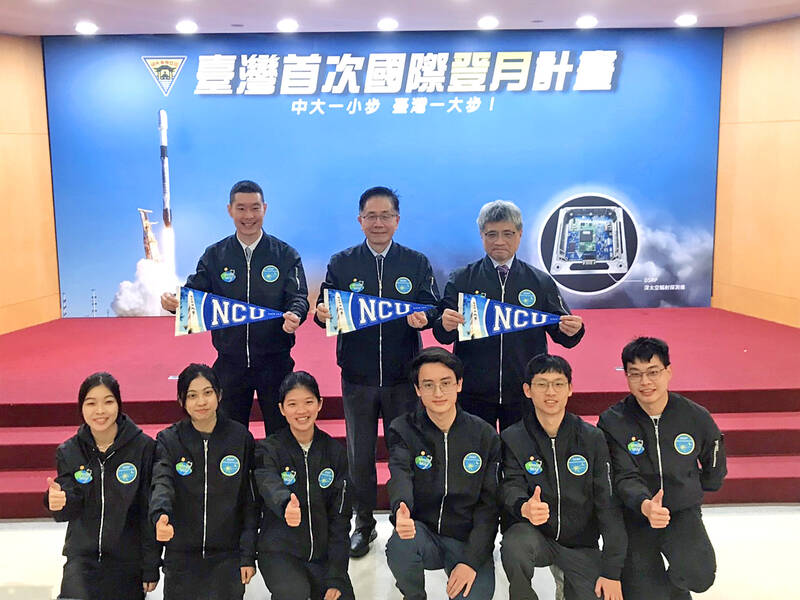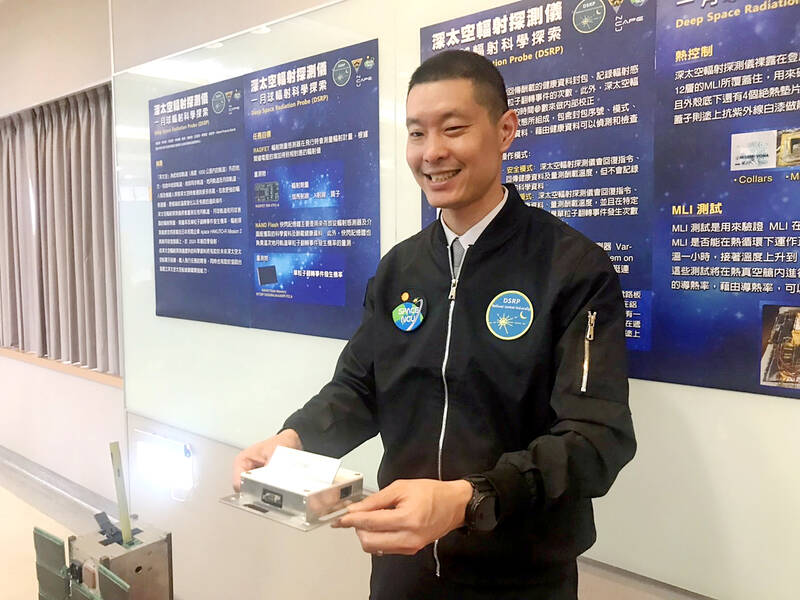The Deep Space Radiation Probe developed by National Central University (NCU) could be launched into space in the fourth quarter of this year after researchers confirmed that the system is ready for the nation’s first moon mission with a Japanese start-up.
“Pleased to report that we have successfully completed the handover of the National Central University Deep Space Radiation Probe (DSRP) payload to ispace Inc for integration with the Hakuto-R Mission 2 Resilience lunar lander,” NCU Department of Space Science and Engineering professor and dean Loren Chang (張起維) wrote on Facebook.
“Final payload software updates and functional checks were performed to verify that the DSRP flight model is ready for the mission to characterize the ionizing radiation environment from the Earth to the moon and its effects on electronics,” he wrote.

Photo: Yang Mien-chieh, Taipei Times
“Thank you to the student members of the DSRP payload team for designing, implementing and qualifying Taiwan’s first lunar payload in 21 months, as well as the ispace team for your support and guidance. We look forward to launching in Q4 of this year, as well as continuing collaboration and exchanges on this and future missions,” he wrote.
Various nations have begun planning missions to the moon in the past few years, hoping to establish permanent bases to harness lunar resources, Chang told a news conference in Taipei yesterday.
Increasingly more opportunities would be available in the near future for small and medium-sized satellites to ride along with larger projects to deep space or the moon, he said.

Photo: Yang Mien-chieh, Taipei Times
“Deep space is more than 2,000km away from Earth, and ionizing radiation in deep space is expected to create problems for electronic devices and life forms flying in it. However, the radiation is either blocked by the Earth or absorbed by the atmosphere,” Chang said.
“To have a deeper understanding of space radiation, we hope to measure it from Earth to the moon and the speed of its accumulation, which can serve as a reference for space missions or be considered when designing electronic and space products,” he added.
There are strict requirements for the size, weight and power consumption for the payload system, he said.
The weight must be less than 400g, which is equivalent to one bag of tea, and only slightly larger than the palm of a human hand, he said.
“It also needs to survive in the extreme temperatures of space for at least four months, and [we must] ensure that it does not crash and can perform its mission,” Chang said.

CHAOS: Iranians took to the streets playing celebratory music after reports of Khamenei’s death on Saturday, while mourners also gathered in Tehran yesterday Iranian Supreme Leader Ayatollah Ali Khamenei was killed in a major attack on Iran launched by Israel and the US, throwing the future of the Islamic republic into doubt and raising the risk of regional instability. Iranian state television and the state-run IRNA news agency announced the 86-year-old’s death early yesterday. US President Donald Trump said it gave Iranians their “greatest chance” to “take back” their country. The announcements came after a joint US and Israeli aerial bombardment that targeted Iranian military and governmental sites. Trump said the “heavy and pinpoint bombing” would continue through the week or as long

TRUST: The KMT said it respected the US’ timing and considerations, and hoped it would continue to honor its commitments to helping Taiwan bolster its defenses and deterrence US President Donald Trump is delaying a multibillion-dollar arms sale to Taiwan to ensure his visit to Beijing is successful, a New York Times report said. The weapons sales package has stalled in the US Department of State, the report said, citing US officials it did not identify. The White House has told agencies not to push forward ahead of Trump’s meeting with Chinese President Xi Jinping (習近平), it said. The two last month held a phone call to discuss trade and geopolitical flashpoints ahead of the summit. Xi raised the Taiwan issue and urged the US to handle arms sales to

BIG SPENDERS: Foreign investors bought the most Taiwan equities since 2005, signaling confidence that an AI boom would continue to benefit chipmakers Taiwan Semiconductor Manufacturing Co’s (TSMC, 台積電) market capitalization swelled to US$2 trillion for the first time following a 4.25 percent rally in its American depositary receipts (ADR) overnight, putting the world’s biggest contract chipmaker sixth on the list of the world’s biggest companies by market capitalization, just behind Amazon.com Inc. The site CompaniesMarketcap.com ranked TSMC ahead of Saudi Aramco and Meta Platforms Inc. The Taiwanese company’s ADRs on Tuesday surged to US$385.75 on the New York Stock Exchange, as strong demand for artificial intelligence (AI) applications led to chip supply constraints and boost revenue growth to record-breaking levels. Each TSMC ADR represents

State-run CPC Corp, Taiwan (CPC, 台灣中油) yesterday said that it had confirmed on Saturday night with its liquefied natural gas (LNG) and crude oil suppliers that shipments are proceeding as scheduled and that domestic supplies remain unaffected. The CPC yesterday announced the gasoline and diesel prices will rise by NT$0.2 and NT$0.4 per liter, respectively, starting Monday, citing Middle East tensions and blizzards in the eastern United States. CPC also iterated it has been reducing the proportion of crude oil imports from the Middle East and diversifying its supply sources in the past few years in response to geopolitical risks, expanding